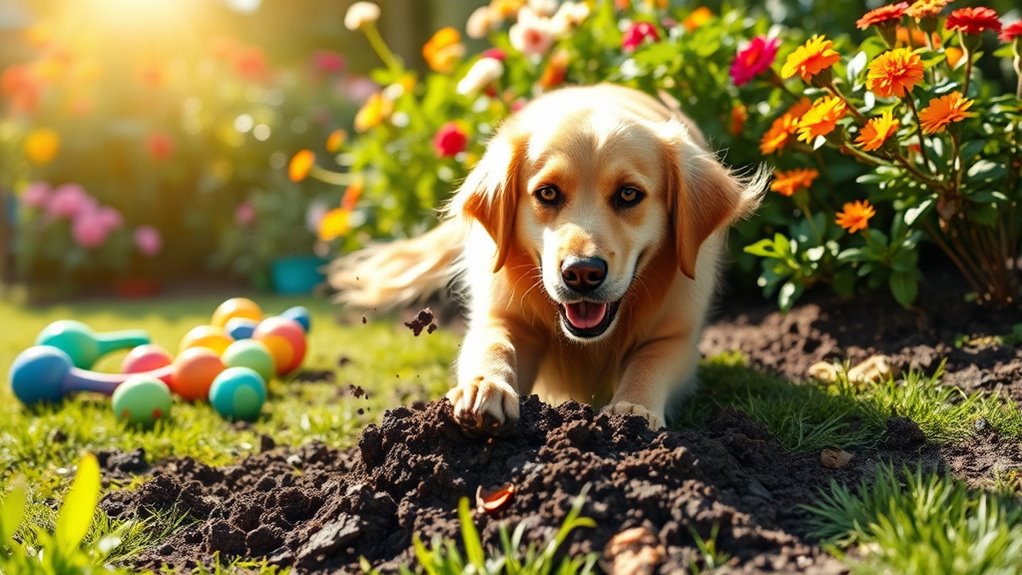Dogs dig for several reasons, including their natural instincts, boredom, anxiety, and curiosity. They might be seeking comfort or trying to explore intriguing scents underground. To curb this behavior, provide regular exercise, mental stimulation, and a designated digging zone. Creating a comfortable environment can also help. Engaging activities and toys keep them entertained, reducing unwanted digging. Discovering the root cause of their digging will help you find the best solution for your furry friend.
Key Takeaways
- Digging is instinctual behavior rooted in dogs’ ancestors’ survival needs, including creating shelter and finding food.
- Boredom or lack of stimulation often leads to digging; regular exercise and playtime can mitigate this urge.
- Dogs dig for comfort, seeking cozy spots; providing a shaded area or designated digging zone can satisfy this need.
- Anxiety or stress can trigger digging; addressing these emotional needs through behavior modification is essential.
- Curiosity drives dogs to dig; redirecting their attention with toys or activities helps channel this natural instinct appropriately.

While you might find your dog digging in the yard frustrating, it’s important to understand that this behavior is often instinctual and can serve various purposes. Dogs have natural instincts that drive them to dig. In the wild, their ancestors dug to create shelter, find food, or even hide from predators. Even though your furry friend lives a comfortable life indoors, those instincts can still surface, prompting them to dig in your garden or lawn.
If your dog is digging, it might be a sign they’re bored or looking for something to entertain themselves. When dogs don’t have enough physical or mental stimulation, they often turn to digging as a way to release pent-up energy. Providing your dog with plenty of exercise, playtime, and varied activities will help curb this behavior. Regular walks, games of fetch, and interactive toys can keep them engaged and reduce the urge to dig.
Another reason your dog might dig is to seek comfort. Dogs sometimes dig in their beds or blankets to create a cozy spot. If your dog is digging in your yard, they might be trying to find a cool place to lie down on a hot day. Providing a shaded area or a comfortable dog house can help with this behavior. Additionally, ensuring they have a designated digging area can satisfy their instincts while minimizing damage to your yard.
Digging can also be a sign of anxiety or stress. If your dog feels insecure or is dealing with separation anxiety, digging might be a way to cope with those feelings. In such cases, it’s *vital* to address the root cause of their anxiety. Consider behavior modification techniques, and consult a veterinarian or a professional dog trainer for guidance. They can help you implement strategies for digging prevention while ensuring your dog feels secure.
Lastly, some dogs dig out of sheer curiosity. They might smell something intriguing underground or want to explore what lies beneath the surface. Monitoring your dog and redirecting their attention when they start digging can help. By offering toys or engaging them in a different activity, you can channel their curiosity into more suitable outlets.
Understanding your dog’s instincts is key to managing their digging behavior. By providing enrichment, exercise, and a sense of security, you can effectively reduce the digging and create a happier environment for both of you. Additionally, incorporating market research can help you better understand your dog’s needs and preferences, leading to more effective solutions.
Frequently Asked Questions
Can Digging Be a Sign of Anxiety in Dogs?
Yes, digging can definitely be a sign of dog anxiety. If you notice your dog digging excessively, it might indicate they’re feeling stressed or overwhelmed. Look for other behavioral signs, like pacing or excessive barking, which can further confirm their anxiety. It’s important to address these feelings by providing a safe space, engaging them in calming activities, or consulting a professional trainer to help alleviate their stress and improve their well-being.
What Are Some Safe Digging Alternatives for Dogs?
You can provide safe digging alternatives by creating a designated digging area filled with sand or soft soil. Encourage natural play by burying toys or treats in this spot, giving your dog a fun challenge. Additionally, use puzzles or interactive toys to boost mental stimulation, keeping them engaged and happy. Regular walks and playtime also help channel their energy, reducing the urge to dig in unwanted areas around your home.
How Can I Stop My Dog From Digging in the Garden?
To stop your dog from digging in the garden, you can redirect their energy into outdoor activities. Create a designated digging area with sand or loose soil where they’re allowed to dig. Reinforce garden maintenance by using barriers or fencing to protect your plants. Consistently supervise your dog during playtime, rewarding them when they play appropriately. Engaging them with toys or games can also keep their focus away from your garden.
Are Certain Dog Breeds More Prone to Digging?
You might be surprised to learn that certain dog breeds are indeed more prone to digging. Breeds like terriers, hounds, and herding dogs have strong digging instincts due to their original purposes. These breed tendencies often drive them to dig for fun, to explore, or to chase small animals. If your dog belongs to one of these breeds, understanding their instincts can help you manage their behavior and provide appropriate outlets for their energy.
Is Digging More Common in Puppies or Adult Dogs?
Digging’s more common in puppies than adult dogs. As a puppy, your dog’s natural curiosity and playful energy drive this behavior. They explore their environment, often digging to uncover hidden scents or create a cozy spot. Adult dogs, on the other hand, may dig out of boredom or anxiety, reflecting different tendencies. While both age groups can dig, understanding puppy behavior helps you manage and redirect this instinctive urge effectively.
Conclusion
So, while it might seem your dog’s digging is just a quirky habit, it’s really their way of expressing boredom, anxiety, or even just a love for exploration. Who knew a little dirt could hold such profound meaning? Instead of scolding them, embrace their inner archaeologist! With the right enrichment activities, you can turn that digging instinct into a fun game. After all, wouldn’t you want to unearth treasures if you had a nose for it?








